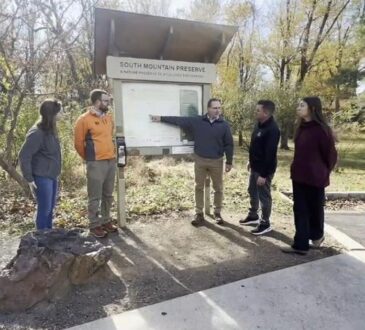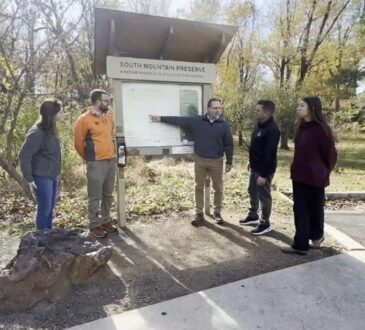
The U.S. Department of Justice on Thursday announced charges against two real estate executives accused, in two unrelated cases, of misappropriating millions of dollars in state funds allocated to combat homelessness.
Prosecutors charged Steven Taylor, 44, with seven counts of bank fraud, one count of aggravated identity theft, and one count of money laundering related to a property in Cheviot Hills that he bought and then sold to the nonprofit housing developer Weingart Center Assn. using funding from the state’s Homekey initiative.
Taylor is accused of lying to the lender funding his purchase of the Cheviot Hills property, saying that he intended to renovate and use the property himself.
Taylor had already contracted to sell the property, which he originally bought for $11.2 million allegedly using fake bank statements to get financing, to Weingart for $27.3 million using state and city funds, prosecutors said. The U.S. Attorney said this involved a double-escrow transaction that was hidden from the lender and others.
Prosecutors said they were investigating what the city and Weingart knew about Taylor’s actions.
In the second case, Cody Holmes, 31, a Beverly Hills man who was the CFO of affordable housing developer Shangri-La, was arrested Thursday morning for his role in another Homekey project.
The state paid $25.9 million in Homekey money to affordable housing developer Shangri-La Industries LLC to convert a building in Thousand Oaks into homeless housing.
Prosecutors said Holmes and Shangri-La submitted fake balance sheets to the state, overstating the cash it had.
The grant funds were then used to pay credit card bills for American Express accounts associated with Holmes, prosecutors said. In November and December of 2022, more than $2.2 million was transferred from a Shangri-La account to a Holmes-controlled account. From November 2022 to May 2023, more than $2 million was paid towards American Express cards, including transactions at luxury retailers.
“Accountability for the misuse of billions of tax dollars intended to combat homeless starts today,” Acting United States Attorney Bill Essayli said in a statement. “The two criminal cases announced is only the tip of the iceberg and we intend to aggressively pursue all leads and hold anyone who broke any federal laws criminally liable.”
“If you steal money, or allow it to be stolen, we will find you and we will prosecute you,” he said at a news conference Thursday morning.
California Attorney general filed a civil case against Shangri-La Industries in January 2024 seeking the return of more than $100 million in Project Homekey funds and asking the court to place seven properties in receivership.
The complaint alleged that Shangri-La took out loans on six of the seven properties without obtaining approval from the state or recording the required affordability restrictions on the properties. The state learned of the problem when banks sent notices of default.
The lawsuit named Shangri-La’s chief executive Andy Meyers and Santa Monica-based homeless housing service provider Step Up on Second but did not name Holmes.
Shangri-La obtained more than $114 million through California’s Project Homekey program to convert seven motels into apartments for formerly unhoused tenants.
Partnering with Santa Monica service provider Step Up on Second, Shangri-La expanded nationally starting motel conversion projects in Denver and four South Carolina counties, according to local news reports.
None of those projects were completed.
The charges announced Thursday come six months after Essayli announced the launch of a federal task force to investigate potential fraud and corruption involving local homelessness funds and among growing concern from the public and some elected officials that the money spent hasn’t resulted in larger drops the number of people sleeping on the street.
The number of homeless people across L.A. County dropped 4% this year, according to the annual count released in July. An estimated 72,308 people were living in shelters or on the streets in the county, including 43,699 people in the city of L.A.
Earlier this year, the L.A. County Board of Supervisors voted to remove county funds from the Los Angeles Homeless Services Authority and set up its own homeless department. The move followed two critical audits that found LAHSA, a joint city-county agency, failed to properly track its funds and programs, leaving them vulnerable to waste and fraud.
One of the audits, commissioned by U.S. District Judge David O. Carter as part of a lawsuit by a group alleging that city and county had done little to address homelessness, found that LAHSA does not have the adequate financial oversight to ensure that its contractors deliver the services they are paid to provide.




